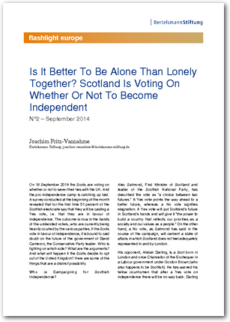On 18 September 2014 the Scots are voting on whether or not to sever their ties with the UK. And the pro-independence camp is catching up fast. A survey conducted at the beginning of the month revealed that for the first time 51 percent of the Scottish electorate say that they will be casting a Yes vote, i.e. that they are in favour of independence. The outcome is now in the hands of the undecided voters, who are currently being heavily courted by the various parties. If the Scots vote in favour of independence, it is bound to cast doubt on the future of the government of David Cameron, the Conservative Party leader. Who is fighting on which side? What are the arguments? And what will happen if the Scots decide to opt out of the United Kingdom? Here are some of the things that are a distinct possibility.
Who is Campaigning for Scottish Independence?
Alec Salmond, First Minister of Scotland and leader of the Scottish National Party, has described the vote as "a choice between two futures." A Yes vote points the way ahead to a better future, whereas a No vote signifies stagnation. A Yes vote will put Scotland’s future in Scotland’s hands and will give it "the power to build a country that reflects our priorities as a society and our values as a people." On the other hand, a No vote, as Salmond has said in the course of the campaign, will cement a state of affairs in which Scotland does not feel adequately represented in and by London.



